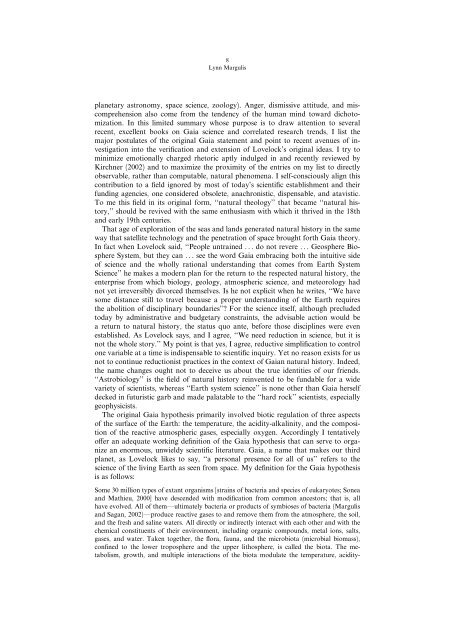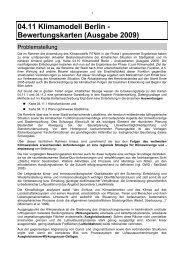Die Gaia-Hypothese - WordPress – www.wordpress.com
Die Gaia-Hypothese - WordPress – www.wordpress.com
Die Gaia-Hypothese - WordPress – www.wordpress.com
Sie wollen auch ein ePaper? Erhöhen Sie die Reichweite Ihrer Titel.
YUMPU macht aus Druck-PDFs automatisch weboptimierte ePaper, die Google liebt.
8<br />
Lynn Margulis<br />
planetary astronomy, space science, zoology). Anger, dismissive attitude, and mis<strong>com</strong>prehension<br />
also <strong>com</strong>e from the tendency of the human mind toward dichotomization.<br />
In this limited summary whose purpose is to draw attention to several<br />
recent, excellent books on <strong>Gaia</strong> science and correlated research trends, I list the<br />
major postulates of the original <strong>Gaia</strong> statement and point to recent avenues of investigation<br />
into the verification and extension of Lovelock’s original ideas. I try to<br />
minimize emotionally charged rhetoric aptly indulged in and recently reviewed by<br />
Kirchner (2002) and to maximize the proximity of the entries on my list to directly<br />
observable, rather than <strong>com</strong>putable, natural phenomena. I self-consciously align this<br />
contribution to a field ignored by most of today’s scientific establishment and their<br />
funding agencies, one considered obsolete, anachronistic, dispensable, and atavistic.<br />
To me this field in its original form, ‘‘natural theology’’ that became ‘‘natural history,’’<br />
should be revived with the same enthusiasm with which it thrived in the 18th<br />
and early 19th centuries.<br />
That age of exploration of the seas and lands generated natural history in the same<br />
way that satellite technology and the penetration of space brought forth <strong>Gaia</strong> theory.<br />
In fact when Lovelock said, ‘‘People untrained . . . do not revere . . . Geosphere Biosphere<br />
System, but they can . . . see the word <strong>Gaia</strong> embracing both the intuitive side<br />
of science and the wholly rational understanding that <strong>com</strong>es from Earth System<br />
Science’’ he makes a modern plan for the return to the respected natural history, the<br />
enterprise from which biology, geology, atmospheric science, and meteorology had<br />
not yet irreversibly divorced themselves. Is he not explicit when he writes, ‘‘We have<br />
some distance still to travel because a proper understanding of the Earth requires<br />
the abolition of disciplinary boundaries’’? For the science itself, although precluded<br />
today by administrative and budgetary constraints, the advisable action would be<br />
a return to natural history, the status quo ante, before those disciplines were even<br />
established. As Lovelock says, and I agree, ‘‘We need reduction in science, but it is<br />
not the whole story.’’ My point is that yes, I agree, reductive simplification to control<br />
one variable at a time is indispensable to scientific inquiry. Yet no reason exists for us<br />
not to continue reductionist practices in the context of <strong>Gaia</strong>n natural history. Indeed,<br />
the name changes ought not to deceive us about the true identities of our friends.<br />
‘‘Astrobiology’’ is the field of natural history reinvented to be fundable for a wide<br />
variety of scientists, whereas ‘‘Earth system science’’ is none other than <strong>Gaia</strong> herself<br />
decked in futuristic garb and made palatable to the ‘‘hard rock’’ scientists, especially<br />
geophysicists.<br />
The original <strong>Gaia</strong> hypothesis primarily involved biotic regulation of three aspects<br />
of the surface of the Earth: the temperature, the acidity-alkalinity, and the <strong>com</strong>position<br />
of the reactive atmospheric gases, especially oxygen. Accordingly I tentatively<br />
o¤er an adequate working definition of the <strong>Gaia</strong> hypothesis that can serve to organize<br />
an enormous, unwieldy scientific literature. <strong>Gaia</strong>, a name that makes our third<br />
planet, as Lovelock likes to say, ‘‘a personal presence for all of us’’ refers to the<br />
science of the living Earth as seen from space. My definition for the <strong>Gaia</strong> hypothesis<br />
is as follows:<br />
Some 30 million types of extant organisms [strains of bacteria and species of eukaryotes; Sonea<br />
and Mathieu, 2000] have descended with modification from <strong>com</strong>mon ancestors; that is, all<br />
have evolved. All of them—ultimately bacteria or products of symbioses of bacteria (Margulis<br />
and Sagan, 2002)—produce reactive gases to and remove them from the atmosphere, the soil,<br />
and the fresh and saline waters. All directly or indirectly interact with each other and with the<br />
chemical constituents of their environment, including organic <strong>com</strong>pounds, metal ions, salts,<br />
gases, and water. Taken together, the flora, fauna, and the microbiota (microbial biomass),<br />
confined to the lower troposphere and the upper lithosphere, is called the biota. The metabolism,<br />
growth, and multiple interactions of the biota modulate the temperature, acidity-




